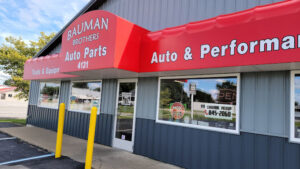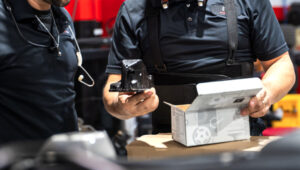Company will pay the civil penalty for failing to lawfully and completely conduct 189 safety and emissions inspections on fleet trucks and trucks
Boston—Attorney General Andrea Joy Campbell has reached a settlement with Penske Truck Leasing Co., LP, a national truck rental company, and six of its inspectors, for allegedly issuing passing inspection certificates to heavy-duty trucks that underwent fraudulent safety and emissions inspections, most of which occurred at its New Bedford facility located at 1242 Shawmut Avenue.
Under the terms of the consent judgment, entered in Suffolk Superior Court, Penske will pay up to a $3.5 million civil penalty for failing to lawfully and completely conduct 189 safety and emissions inspections on fleet trucks and trucks that Penske rented and leased for commercial use. These failures are violations of the Massachusetts Clean Air Act’s Motor Vehicle Inspection Program, the Massachusetts Inspection and Maintenance Act and the Massachusetts Consumer Protection Act.
“By issuing inspection certificates without ensuring that the critical safety and emissions components of these trucks were actually working, Penske put the health and safety of the public and Penske’s drivers at significant risk,” said AG Campbell. “The fraudulent emissions inspections also risked potential environmental harm to New Bedford and its nearby communities. I am grateful to our partner agencies for joining my office’s efforts to hold this company accountable, keep our roads safe, and further environmental justice in the New Bedford area.”
“Vehicle emission inspections play a critical role in improving air quality, as transportation is the largest contributor of smog and air pollution,” said Commissioner Bonnie Heiple of the Massachusetts Department of Environmental Protection (MassDEP). “Simply put, fraudulent inspections jeopardize public health and the environment. Communities rely on inspection stations, such as Penske’s, to be responsible and perform all vehicle inspections in accordance with state and federal law. MassDEP will continue to work with the Registry of Motor Vehicles and the Attorney General’s Office to hold violators accountable.”
“The integrity of the vehicle inspection process is critical for roadway safety,” said RMV Registrar Colleen Ogilvie. “The RMV appreciates the efforts of all involved to hold these inspectors accountable. We remain committed to ensuring compliance with the Massachusetts Inspection and Maintenance Act.”
Under the consent judgment, Penske is required to pay $3 million up front, and another $500,000, unless Penske complies with the other terms of the agreement, including the requirements that Penske provide enhanced training for inspectors at the New Bedford facility and hire a third-party to perform audits of its mobile vehicle inspections for six months.
The inspectors who conducted the illegal inspections are barred from performing motor vehicle inspections indefinitely. They are Frank Gregory, Jeffrey Adams, Justin Travers, Aaron Milosek, Allen Russell and Alex Martinez.
The lawsuit, brought by the Attorney General’s Office in 2021, alleges that Penske inspectors failed to properly conduct 129 safety inspections and conducted at least 123 fraudulent emissions inspections on fleet vehicles, including heavy-duty diesel-powered trucks weighing more than 10,000 pounds. According to the complaint, the inspectors failed to inspect brakes, the fifth wheel (which connects the trailer to the cab of the truck), and tire and wheel components. Some inspection videos show that during the fraudulent inspections, the inspector did not even go under the vehicle, which is necessary to view these components to determine if they are functioning properly.
Additionally, these trucks should have undergone smoke opacity testing, which measures the density of black smoke in a vehicle’s exhaust. But according to the complaint, the Penske inspectors used a variety of illegal methods to falsify passing results for Penske’s trucks or evade monitoring, including failing to put the smoke reader fully into the tailpipe, using a video of a different vehicle being inspected, or conducting the test out of view of cameras and then used the fraudulent results to issue passing inspection stickers to different vehicles.










Comments are closed.